Title search results
Showing 1 - 5 of 5 items
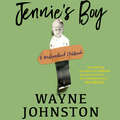
Jennie's Boy: A Newfoundland Childhood
By Wayne Johnston. 2022
Consummate storyteller and bestselling novelist Wayne Johnston reaches back into his past to bring us a sad, tender and at…
times extremely funny memoir of his Newfoundland boyhood.For six months between 1966 and 1967, Wayne Johnston and his family lived in a wreck of a house across from his grandparents in Goulds, Newfoundland. At seven, Wayne was sickly and skinny, unable to keep food down, plagued with insomnia and a relentless cough that no doctor could diagnose, though they had already removed his tonsils, adenoids and appendix. To the neighbours, he was known as "Jennie’s boy," a backhanded salute to his tiny, ferocious mother, who felt judged for Wayne’s condition at the same time as worried he might never grow up. Unable to go to school, Wayne spent his days with his witty, religious, deeply eccentric maternal grandmother, Lucy. During these six months of Wayne’s childhood, he and Lucy faced two life-or-death crises, and only one of them lived to tell the tale. Jennie’s Boy is Wayne’s tribute to a family and a community that were simultaneously fiercely protective of him and fed up with having to make allowances for him. His boyhood was full of pain, yes, but also tenderness and Newfoundland wit. By that wit, and through love—often expressed in the most unloving ways—Wayne survived.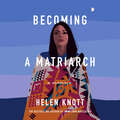
Becoming a Matriarch
By Helen Knott. 2023
When matriarchs begin to disappear, there is a choice to either step into the places they left behind, or to…
craft a new space.Helen Knott’s debut memoir, In My Own Moccasins, wowed reviewers, award juries, and readers alike with its profoundly honest and moving account of addiction, intergenerational trauma, resilience, and survival. Now, in her highly anticipated second book, Knott returns with a chronicle of grief, love, and legacy.Having lost both her mom and grandmother in just over six months, forced to navigate the fine lines between matriarchy, martyrdom, and codependency, Knott realizes she must let go, not just of the women who raised her, but of the woman she thought she was.Woven into the pages are themes of mourning, sobriety through loss, and generational dreaming. Becoming a Matriarch is charted with poetic insights, sass, humour, and heart, taking the reader over the rivers and mountains of Dane Zaa territory in Northeastern British Columbia, along the cobbled streets of Antigua, Guatemala, and straight to the heart of what matriarchy truly means. This is a journey through pain, on the way to becoming.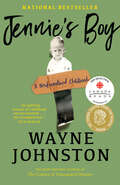
Jennie's Boy: A Newfoundland Childhood
By Wayne Johnston. 2022
NATIONAL BESTSELLERNAMED A BEST BOOK OF THE YEAR BY THE CBCWINNER OF THE 2023 LEACOCK MEDAL FOR HUMOURConsummate storyteller and…
bestselling novelist Wayne Johnston reaches back into his past to bring us a sad, tender and at times extremely funny memoir of his Newfoundland boyhood.For six months between 1966 and 1967, Wayne Johnston and his family lived in a wreck of a house across from his grandparents in Goulds, Newfoundland. At seven, Wayne was sickly and skinny, unable to keep food down, plagued with insomnia and a relentless cough that no doctor could diagnose, though they had already removed his tonsils, adenoids and appendix. To the neighbours, he was known as &“Jennie&’s boy,&” a backhanded salute to his tiny, ferocious mother, who felt judged for Wayne&’s condition at the same time as worried he might never grow up.Unable to go to school, Wayne spent his days with his witty, religious, deeply eccentric maternal grandmother, Lucy. During these six months of Wayne&’s childhood, he and Lucy faced two life-or-death crises, and only one of them lived to tell the tale.Jennie&’s Boy is Wayne&’s tribute to a family and a community that were simultaneously fiercely protective of him and fed up with having to make allowances for him. His boyhood was full of pain, yes, but also tenderness and Newfoundland wit. By that wit, and through love—often expressed in the most unloving ways—Wayne survived.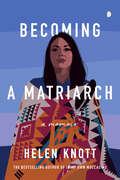
Becoming a Matriarch
By Helen Knott. 2023
When matriarchs begin to disappear, there is a choice to either step into the places they left behind, or to…
craft a new space.Helen Knott&’s debut memoir, In My Own Moccasins, wowed reviewers, award juries, and readers alike with its profoundly honest and moving account of addiction, intergenerational trauma, resilience, and survival. Now, in her highly anticipated second book, Knott returns with a chronicle of grief, love, and legacy.Having lost both her mom and grandmother in just over six months, forced to navigate the fine lines between matriarchy, martyrdom, and codependency, Knott realizes she must let go, not just of the women who raised her, but of the woman she thought she was.Woven into the pages are themes of mourning, sobriety through loss, and generational dreaming. Becoming a Matriarch is charted with poetic insights, sass, humour, and heart, taking the reader over the rivers and mountains of Dane Zaa territory in Northeastern British Columbia, along the cobbled streets of Antigua, Guatemala, and straight to the heart of what matriarchy truly means. This is a journey through pain, on the way to becoming.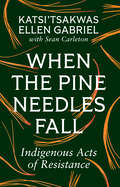
When the Pine Needles Fall: Indigenous Acts of Resistance
By Katsi’tsakwas Ellen Gabriel. 2024
One of CBC Books Best Canadian Nonfiction Books of 2024 There have been many things written about Canada’s violent siege…
of Kanehsatà:ke and Kahnawà:ke in the summer of 1990, but When the Pine Needles Fall: Indigenous Acts of Resistance is the first book from the perspective of Katsi’tsakwas Ellen Gabriel, who was the Kanien’kehá:ka (Mohawk) spokesperson during the siege. When the Pine Needles Fall, written in a conversational style by Gabriel with historian Sean Carleton, offers an intimate look at Gabriel’s life leading up to the 1990 siege, her experiences as spokesperson for her community, and her work since then as an Indigenous land defender, human rights activist, and feminist leader. More than just the memoir of an extraordinary individual, When the Pine Needles Fall offers insight into Indigenous language, history, and philosophy, reflections on our relationship with the land, and calls to action against both colonialism and capitalism as we face the climate crisis. Gabriel’s hopes for a decolonial future make clear why protecting Indigenous homelands is vital not only for the survival of Indigenous peoples, but for all who live on this planet.